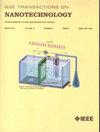Highly Efficient (>36%) Lead-Free Cs2BiAgI6/CIGS Based Double Perovskite Solar Cell (DPSC) With Dual-Graded Light Absorber Layers for Next Generation Photovoltaic (PV) Technologies
IF 2.1
4区 工程技术
Q3 ENGINEERING, ELECTRICAL & ELECTRONIC
引用次数: 0
Abstract
Perovskite solar cells (PSCs) are a novel emerging technology that are the third generation of solar cells, following wafer-based and thin-film-based predecessors. Solar photovoltaic (PV) technology that uses perovskite materials has a significant advantage over conventional solar PV, as it can respond to various light wavelengths and increase the amount of sunlight converted to electricity. In addition, PSCs are flexible, semi-transparent, customizable, lightweight, and have a high power conversion efficiency (PCE). Through the use of dual-graded light absorber/active layers, and double perovskite lead-free material Cs基于双梯度光吸收层的无铅 Cs${}_{2}$ BiAgI$_{6}$/CIGS 双包晶太阳能电池 (DPSC),用于下一代光伏 (PV) 技术
过氧化物太阳能电池(PSCs)是一种新型的新兴技术,是继晶圆太阳能电池和薄膜太阳能电池之后的第三代太阳能电池。与传统的太阳能光伏技术相比,使用了包晶体材料的太阳能光伏技术具有显著优势,因为它能对各种波长的光做出反应,并能增加转化为电能的太阳光量。此外,PSC 具有柔性、半透明、可定制、轻质等特点,并且具有较高的功率转换效率(PCE)。本研究通过使用双分级光吸收剂/活性层和双包晶无铅材料 Cs$_{2}$BiAgI$_{6}$,力求提高 PSC 的效率。利用 SCAPS-1D 一维太阳能电池电容模拟器模拟了基于无铅双包晶石材料的太阳能电池的独特器件结构(ITO/ZnO/双包晶石 Cs$_{2}$BiAgI$_{6}$/CIGS/ 高纯度 Spiro-OMeTAD/Au )。这项工作优化了太阳能电池的输出参数,包括开路电压(Voc)为 1.2258 V,短路电流密度(Jsc)为 34.292 mA/cm$^{2}$,填充因子(FF)为 85.95$/%$,功率转换效率(PCE)为 36.13$/%$,接近单结 PSC 的肖克利-奎塞尔效率(SQ)极限。
本文章由计算机程序翻译,如有差异,请以英文原文为准。
求助全文
约1分钟内获得全文
求助全文
来源期刊

IEEE Transactions on Nanotechnology
工程技术-材料科学:综合
CiteScore
4.80
自引率
8.30%
发文量
74
审稿时长
8.3 months
期刊介绍:
The IEEE Transactions on Nanotechnology is devoted to the publication of manuscripts of archival value in the general area of nanotechnology, which is rapidly emerging as one of the fastest growing and most promising new technological developments for the next generation and beyond.
 求助内容:
求助内容: 应助结果提醒方式:
应助结果提醒方式:


